« Reverse proxy with HTML rewriting using Apache | Home | Disable dragging of an element in JSXGraph »
Reverse engineering the Fischertechnik blinker
By admin | July 13, 2014
The Fischertechnik blinker comes in a enclosed case with no other sensory inputs with two wires, a yellow wire and a blue wire.
As such, I reverse engineered the Fischertechnik blinker to understand how it works through desoldering, a camera, and a lot of drawing on the GIMP.
It turns out that the blinker is intended to be used like a switch in a series circuit before a load, with the yellow lead being the positive end and the blue lead being the negative end.
The main idea here is that the board uses a 555 timer (555C EZ606 with STMicroelectronics logo, surface-mounted) with fixed frequency (fixed R1, R2 and C) in astable mode to control a BSP 75N MOSFET transistor.
The power supply for the ICs is controlled in parallel with a diode and a 470Ω resistor to protect the ICs, while the MOSFET controls the connection to the other lead.
It features an unknown-model fuse (VW UG4 GP613) on the emitter of the transistor, presumably to protect the circuit from excess.
A diode and 100 µF capacitor cap are present, possibly to smooth out the power input for the ICs during temporary dislocations. Considering that it is a Fischertechnik component, its purpose is probably to ensure continued reliability when it is handled roughly, shaken, and dropped by students.
After complete disassembly:
With traces and PCB features:
Schematic:
Since C is a generic-looking ceramic capacitor with no markings, its capacitance was estimated by using the period.
The light was measured to blink 100 times in 41.21 seconds, giving:
$$
T = 0.4121 \text{s} \\
f = 2.426 \text{s}^{-1}
$$
Given R1 = 1 MΩ and R2 = 1.2 MΩ from above and f = 2.426, we can calculate C using the following equation:
$$
f = \dfrac{1}{\ln 2 * C * (R_1 + 2*R_2)}
$$
C then works out to about 0.175 µF.
If you found this article helpful or interesting, please help Compdigitec spread the word. Don’t forget to subscribe to Compdigitec Labs for more useful and interesting articles!
Topics: Electronics | 4 Comments »

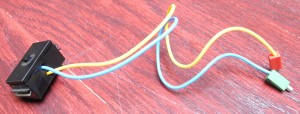
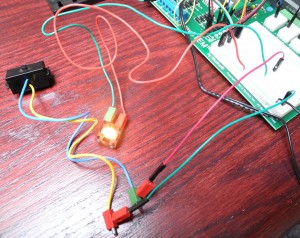
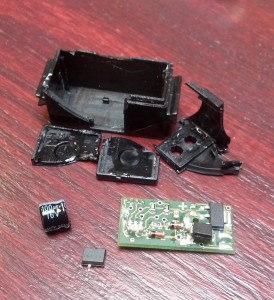
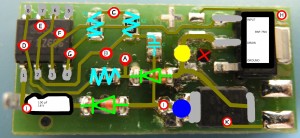
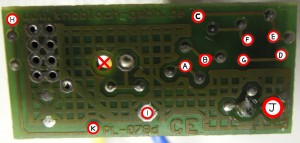

June 23rd, 2024 at 04:44
… [Trackback]
[…] Read More Info here to that Topic: compdigitec.com/labs/2014/07/13/reverse-engineering-the-fischertechnik-blinker/ […]
July 10th, 2024 at 18:29
… [Trackback]
[…] Find More on on that Topic: compdigitec.com/labs/2014/07/13/reverse-engineering-the-fischertechnik-blinker/ […]
July 15th, 2024 at 09:22
… [Trackback]
[…] Read More Info here on that Topic: compdigitec.com/labs/2014/07/13/reverse-engineering-the-fischertechnik-blinker/ […]
July 17th, 2024 at 22:21
… [Trackback]
[…] Read More here on that Topic: compdigitec.com/labs/2014/07/13/reverse-engineering-the-fischertechnik-blinker/ […]